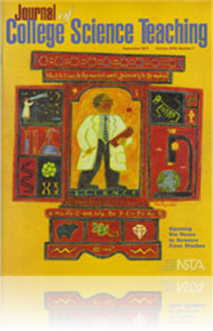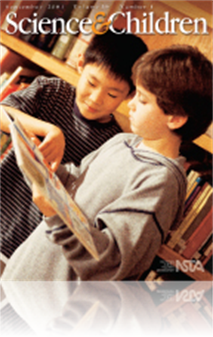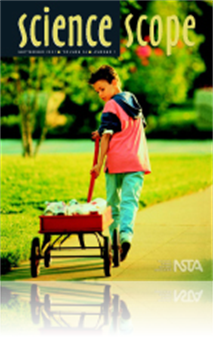All Resources
Journal Article
Idea Bank: Investigating Science Careers Online
The Idea Bank provides tips and techniques for creative teaching, in about 1,000 words. This month’s Idea Bank features ways students can use the Internet to research careers in science and engineering. ...
Journal Article
Alzheimer’s Disease Under Scrutiny
After reading a newspaper article on Alzheimer’s disease, an incurable medical problem involving gradual and debilitating loss of memory, students examine the key elements of the scientific method as conveyed in the story. During their analysis, st...
Journal Article
“We love science! We love science!” cried the first- and second-grade students at Rice Lake Elementary School in Lino Lakes, Minnesota. The science program for primary grade students here is so good that students wanted more. To satiate their add...
Journal Article
The Science-Mathematics Connection: Using technology in an interdisciplinary module
This workshop uses technology-based modules that emphasize multicultural instructional activities, materials, tools, and assessment for integrating concepts in Earth science, algebra, geometry, and statistics. Instruction in the culturally responsiv...
Journal Article
Science teachers face many hurdles in their quest to train young minds to understand the precise planning, thinking, and actions required for success in this field of study. Read about the GLOBE (Global Learning and Observations to Benefit the Enviro...
Journal Article
Exploring Alternative Conceptions
Teaching is an inexact science. Even experienced teachers have difficulty assessing the effectiveness of their lessons and students’ mastery of concept. Teachers must be particularly careful to avoid introducing or reinforcing student misconception...
Journal Article
Commentary: Building on Strengths
An opinion piece about being positive with students....
Journal Article
Although the analemma derives from days when advances in technology meant building a more accurate sundial, the hands-on process of incrementally constructing a model of the analemma is still a worthwhile educational experience. It teaches science, p...
Journal Article
Chemistry Rocks: Redox chemistry as a geologic tool
Teachers can use students’ interest in the color in rocks as a starting point for a redox chemistry lesson. In this activity, each group of students examines one or more of the rocks. By matching a rock’s color to a form of iron allows students t...
Journal Article
All That Glitters May Not Be Gold
In this decision case, a congressional staffer must weigh a number of competing needs, including the popular reactions to genetically modified organisms (GMOs) and the need to eliminate vitamin A deficiency, in deciding how to present information to ...
Journal Article
Editor's Corner: Making a Difference
The Science Teacher’s editor shares thoughts on the current issue, as well as one of the authors sharing stories and background on her teaching career....
Journal Article
Rice is Rice, Right? Who knew that rice could facilitate inquiry?
Inquiry in the classroom can take many forms. The hands-on activity in this article is an economical and simple way to spark the inquiry process. Who knew that rice could facilitate inquiry?...
Journal Article
It was students’ fascination with the television show Survivor that led the author to incorporate the novels Shipwreck at the Bottom of the World (Armstrong 1998) and Carry On, Mr. Bowditch (Latham 1983) into the science curriculum. For four and a ...





